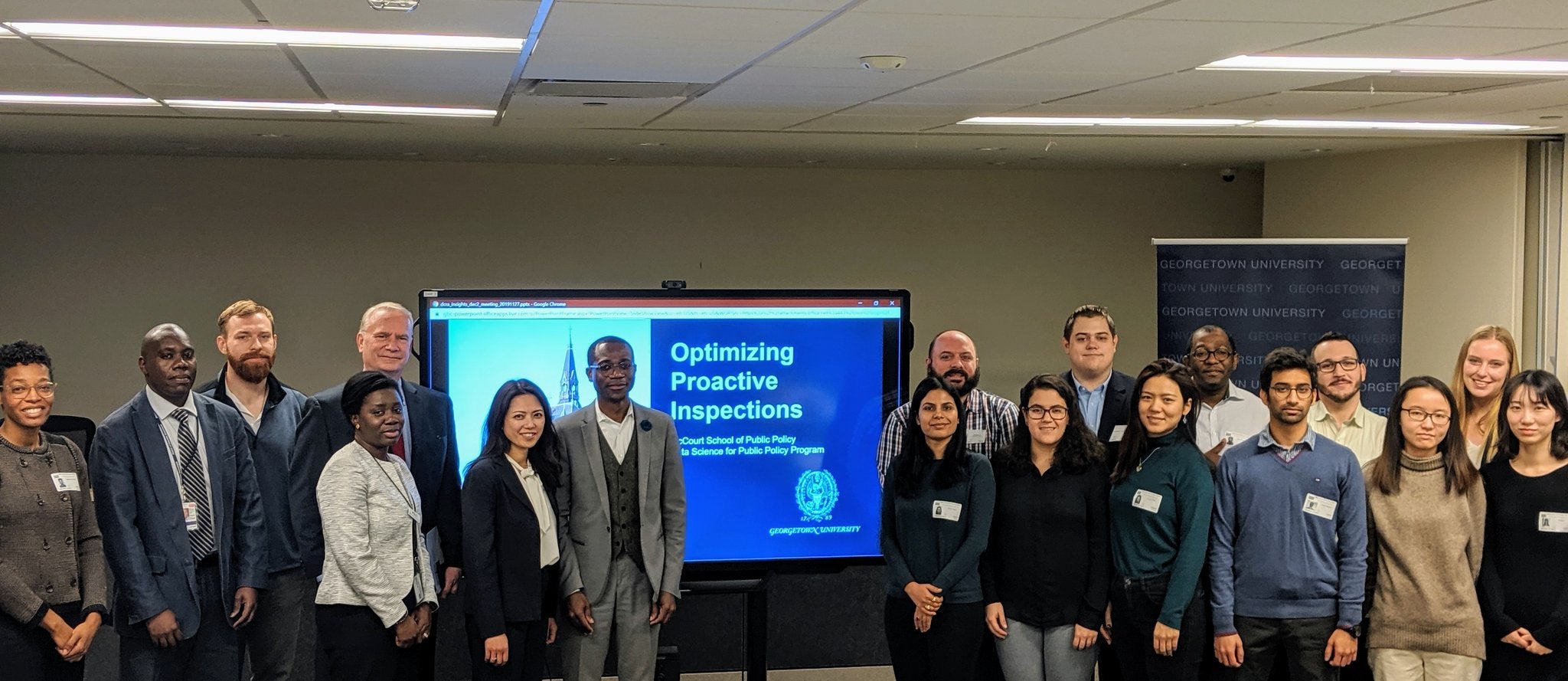Safer Homes: McCourt Students Use Data to Improve Housing Inspections in DC
“Georgetown’s commitment to the common good starts right here in our hometown.”
When the Washington Post and Washington City Paper published well-documented stories about poor conditions in public housing — including broken doors, rat infestations and sewage backups — DC Mayor Muriel Bowser and the DC Council took steps to improve the inspection process used by the city’s Department of Consumer and Regulatory Affairs (DCRA).
The DCRA makes housing inspections for two main reasons: Inspectors visit properties when residents complain, and they make random inspections at houses and developments that have not been inspected over the past four years. The goal is to examine large complexes every few years.
The legacy system at DCRA used a basic computer program to randomly select housing units for inspection from a list of units not inspected in the past four years. NaLette Brodnax, assistant professor of data science at McCourt, offered DCRA Director Ernest Chapprah the assistance of students in her data-science advanced- modeling-techniques class, part of the Data Science for Public Policy program (MS- DSPP). Brodnax and Chapprah agreed that the students would work with DCRA on a new algorithm to make the inspection process more effective. In addition to pro- viding students hands-on experience in the data-science consulting field, the project aimed to make a positive impact in the DC community, in keeping with the university’s Jesuit tradition of “people for others.”
Time to Crunch the Numbers
The students began their quest by meeting with DCRA’s Office of Innovation and its deputy chief building officer to gain a better understanding of the available data and set realistic goals to help optimize the process and maximize resident safety.
Using existing DCRA data, the students identified trends and used them to build risk profiles, taking into consideration the history of prior violations and of complaints based on keywords, renovation dates, license status, ownership type and more.
The students concluded that DCRA could keep the process random while effectively identifying housing units in need of inspection by applying weighted probabilities to the housing units selection process.
“The impact that we are having is really enabling [DCRA] to leverage the information they have to be better at maintaining safe housing for District residents,” Brodnax explains. “This has an impact on potentially thousands of DC residents, many of whom are part of vulnerable populations.”
Ongoing Projects
At the end of the 2019 fall semester, several students presented their findings to DCRA. Director Chapprah and his team aim to use the McCourt School students’ work to further optimize their system moving forward.
In the spring, Brodnax worked with DCRA to integrate the new algorithms into the existing DCRA data software and infrastructure. The partnership between McCourt and the DCRA is ongoing; past student projects included identifying data to better predict vacancies and house-flippings, improve the permit process and more.
“Georgetown’s commitment to the common good starts right here in our home- town, and we are thrilled to partner with DCRA on this project,” said Chris Murphy, Georgetown’s vice president for government relations and community engagement. “It’s a true win-win when we can deploy our faculty and students to help DC government optimize services that will better protect DC residents. Renters in DC will be safer as a result of this project, and we are proud to have played a part in it.”
Hands-on Learning
“I’m really grateful for the opportunity for such hands-on learning, and am interested to see how DCRA chooses to use our results in improving the inspection process,” said Madeline Pickens (MS-DSPP ‘20), one of the students who presented findings to DCRA. “Collaborating with DCRA allowed our class to experience all aspects of the data analysis process, including connecting with stakeholders, building and evaluating models and considering implementation and ethical issues surrounding our results,” Pickens explained.
This post also appeared in Policy Perspectives, the annual alumni magazine from the McCourt School of Public Policy. Click here to view the full digital magazine.
